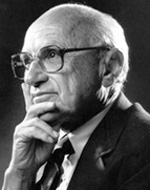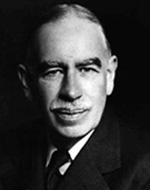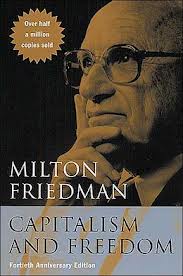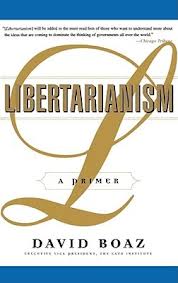Does government involvement in economics help or hurt the economy? This debate is at the heart of this Thinker Education course experience as we investigate the case for a libertarian view of government with noted scholar and economist, Stephen Moore. Mr. Moore has in the past been a part of the Heritage Foundation, the Cato Institute, and began the Club for Growth. He is currently a member of the Wall Street Journal editorial board.
The following chart compares the two major schools of economic thought in America. Politicians and economists have both been highly influenced by one or both of these views. This course examines these views alongside the Libertarian view to help us better understand what history teaches us concerning government involvement in economics.
| “Most economic fallacies derive from the neglect of this simple insight, from the tendency to assume that there is a fixed pie, that one party can gain only at the expense of another.”“The Great Depression, like most other periods of severe unemployment, was produced by government mismanagement rather than by any inherent instability of the private economy.”“Underlying most arguments against the free market is a lack of belief in freedom itself.”“A society that puts equality before freedom will get neither. A society that puts freedom before equality will get a high degree of both.”“Nothing is so permanent as a temporary government program.”
“The great virtue of a free market system is that it does not care what color people are; it does not care what their religion is; it only cares whether they can produce something you want to buy. It is the most effective system we have discovered to enable people who hate one another to deal with one another and help one another.” “Many people want the government to protect the consumer. A much more urgent problem is to protect the consumer from the government.” |
“The long run is a misleading guide to current affairs. In the long run we are all dead.”“Capitalism is the astounding belief that the most wickedest of men will do the most wickedest of things for the greatest good of everyone.”
“The ideas of economists and political philosophers, both when they are right and when they are wrong are more powerful than is commonly understood. Indeed, the world is ruled by little else. Practical men, who believe themselves to be quite exempt from any intellectual influences, are usually slaves of some defunct economist.” “Markets can remain irrational longer than you can remain solvent.” “The decadent international but individualistic capitalism in the hands of which we found ourselves after the war is not a success. It is not intelligent. It is not beautiful. It is not just. It is not virtuous. And it doesn’t deliver the goods.” “The political problem of mankind is to combine three things: economic efficiency, social justice and individual liberty.” |
Milton Friedman had this to say about John Maynard Keynes: “Keynes was a great economist. In every discipline, progress comes from people who make hypotheses, most of which turn out to be wrong, but all of which ultimately point to the right answer. Now Keynes, in The General Theory of Employment, Interest and Money, set forth a hypothesis which was a beautiful one, and it really altered the shape of economics. But it turned out that it was a wrong hypothesis. That doesn’t mean that he wasn’t a great man….”
Version 1.0












